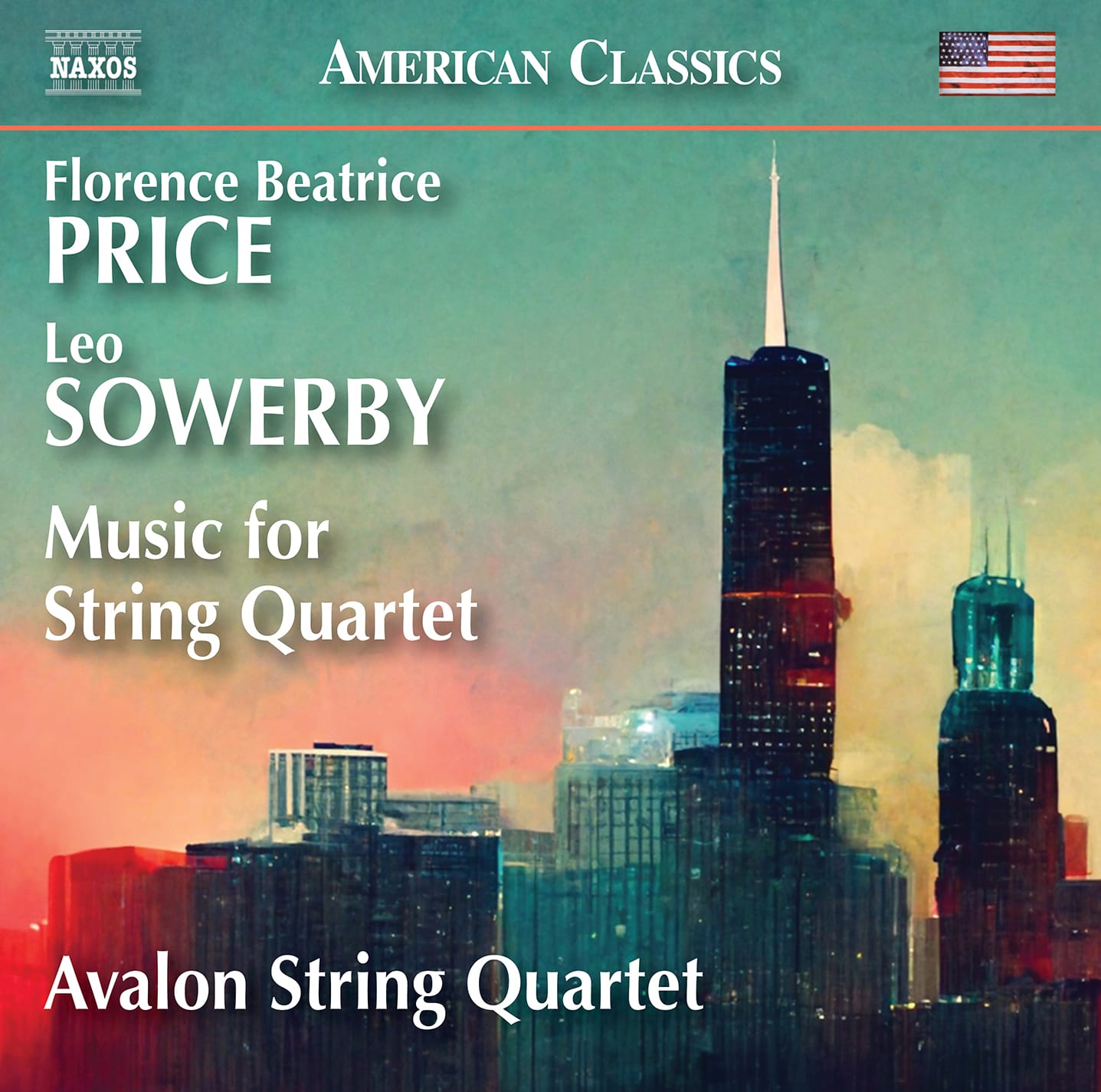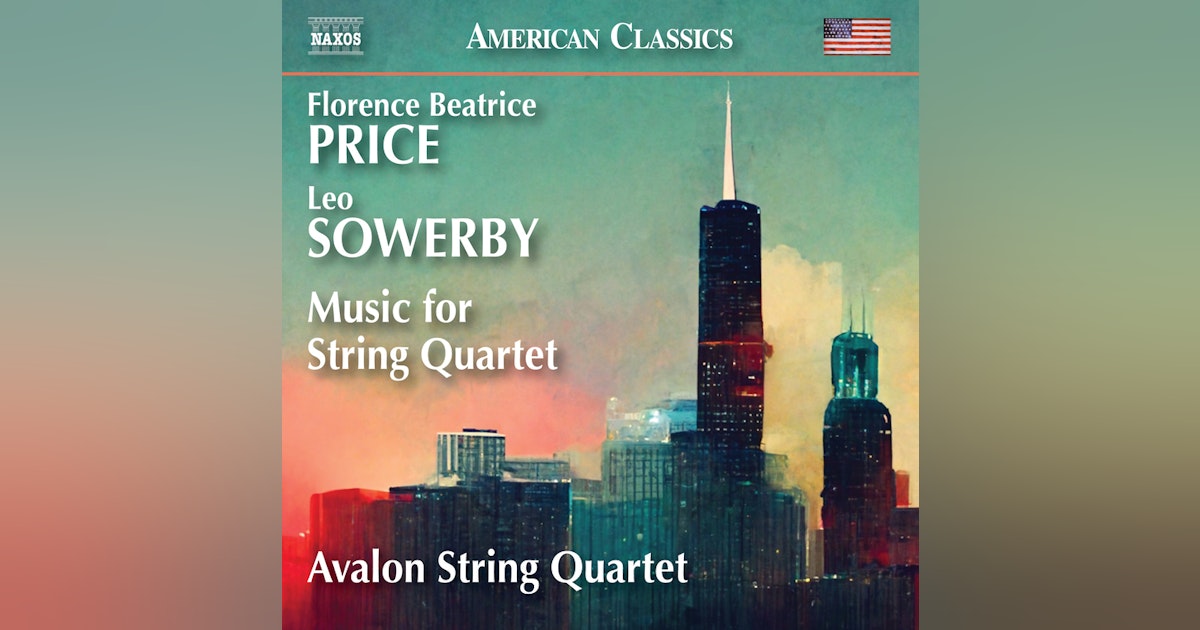American String Quartets: Florence Price & Leo Sowerby
Compelling music in compelling performances

Florence Price 1887-1953) and Leo Sowerby (1895-1968) were contemporaries in 1930s and 1940s Chicago. This is major release in the continued appreciation of their music. Both composers deserve as much airtime as possible.
As to the performers, although not so well known this side of the Pond, the Avalon String Quartet is well-known in America. Here's their bio:
The Avalon String Quartet has established itself as one of America’s leading chamber music ensembles, appearing at major venues such as Carnegie Hall, Alice Tully Hall, and the 92nd Street Y (92NY) in New York; the Library of Congress and National Gallery of Art in Washington DC; Wigmore Hall in London; and Herkulessaal in Munich. The quartet was awarded the top prize at the ARD International Music Competition in Munich (2000) and First Prize at the Concert Artists Guild Competition in New York City (1999). It is the resident quartet at the Northern Illinois University School of Music.
and here's the promo video:
Florence Price's Spring Quartet in A-Minor was completed in 1935; it was never performed in her lifetime, and only published in 2019. What makes it so fascinating is the sophistication of the writing: complex harmonies mixed with music derived form Black idioms. It is more than highly effective: there is the palpable feeling one is experiencing a masterpiece here. Perhaps there is an echo of Dvořák in the coda of the extended first movement; it certainly seems to bleed into the expressive Andante expressive:
The slow movement begins.in A-Major and holds an E-Major (dominant) central section, slightly more animated, and absolutely luminous, especially in this performance.
The third movement has a “Juba” in place of a Scherzo, a slave-era dance marked by its syncopation. Even here Price's inbuilt sophistication rises, with some lively twists of harmony. Price also uses the Juba in her symphonies, incidentally:
Shades of Dvořák surface again in the finale, particularly in the more contrastive, reflective moments:
The performance by the Avalon Quartet is superb. Only in teh first movement is there the occasional feeling of strain; Price's Quartet is well served here.
Amazingly, this is the World Premiere of Leo Sowerby’s half-hour String Quartet in G minor. Previously, Sowerby's music has been well-served by the Çedille label (itself Chicago-based) in both vocal and piano music. Here's the chamber music, in th form of the String Quartet in G-Minor, H 226 (1935).
Sowerby achieved some fame in his time - his music was regularly featured bytes Chicago Symphony and Frederick Stock. His music is superbly crafted, and expressive. Neither of Sowerby's String Quartets were published, and both exist in pencil scores with no dynamics. There is however an archival score used for a 1936 performance by the Jacques Grodon String Quartet, and it is that score that has been consulted by the Avalon musicians.
Contrast are marked in the extended fist movement, but the piece works as a formal who.e This is another world entirely fro Price, darker (in fact, the introduction is actually marked, “Languidly, darkly”. The contrasting main body is marked “Fast, with dash” (!) - and the Avalon Quartet has dash aplenty. This is a truly committed performance. The first movement is nearly a quarter of an hour, and is superbly constructed. This is compelling music in a compelling performance:
The music of Leo Sowerby is a fine amalgam of sophistication and approachability. The spiky Scherzo is somewhat frenzied, and the Avalon Quartet project the underlying sense of disquiet supremely well. The cello melody of the Trio is heavenly, though (if still not entirely settled!):
Marked “Slowly, rhapsodically,” the third movement offers huge contrast. The melodies and harmonies have an almost Mahlerian depth to them and truly speak fro teh heart. Cheng-Hou Lee's cello sings particularly expressively. There's a real grit and heaviness to the lower strings' chords around the four-minute mark, above which Blaise Magnière's violin sings expressively:
The short finale packs a lot into its duration: a fiercely impassioned Recitativo with late-Beethovenian ambitions moves into the natural continuation, a fugue, here sinewy, thorny:
It is worth noting the Avalon String Quartet has also recorded (for Çedille this time) Sowerby's String Quartet in D-Minor and the Serenade.Here's the Serenade in G-Major, H 137:
Florence Price's Five Folksongs in Counterpoint is the perfect conclusion for the disc. Price's handling of material I magisterial: there is real mastery her masked by an was of delivery that is remarkable, and echoes by the Avalon's performance. While lighter via the thematic strands, Prie's compositional virtuosity shines throughout.Here' the sprightly first, and just listen to the variety of texture Price finds:
...and 100% guaranteed you will know the tune of the second. But it's where Price takes the material that is the real gold:
The Avalon find the heart of tenderness of the third. You'll know it: “Drink to m only with thine eyes”:
The fourth is a dance-like celebration of several folksongs before the cello sings out “Sweet Chariot”:
A superb disc. The Avalon String Quartet is an excellent ensemble that clearly revel in rare American repertoire: another release is that of string quartet music by Matthew Quayle (born 1974) which surely warrants investigation ... it's available at Amazon here. Very different, very individual music, and performed just as fervently as the Price and Sowerby.
This wonderful disc is available at Amazon.


